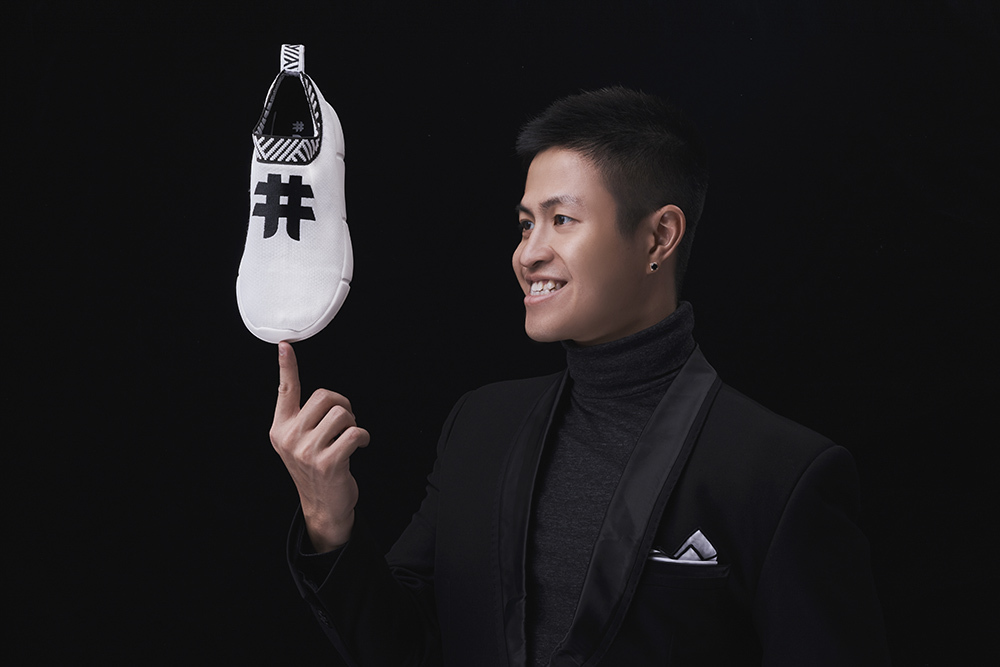Jesse Khanh Tran, born in 1992, and Son Chu, born in 1996, met each other in Finland while they were studying.

Khanh said: “Both Son and I still haven't defended our theses to obtain bachelor’s degree for Son and master’s degree for me." Khanh pursued a master’s degree in international business and logistics at Aalto University, the leading university in Finland.
Both of of them decided to put off their thesis preparations to spend time on their business.
After a period of working as an employee, Khanh began running his own business. His first startup helped European small fashion brands work with high-quality environmentally friendly factories in Vietnam and China.
However, the first business was ineffective. With experience in the fashion industry, Khanh and Son then set up Rens Originals. At that time, Son was working for Zalando, the largest European fashion e-commerce site.
At first, Rens’ shoes were not made of coffee grounds and plastics, but of organic cotton. When surveying the market, the two realized that their products were not truly appreciated, so they decided not to market them. Later, they decided to use coffee grounds as a material.
“We chose coffee grounds because they dry fast and have anti-bacteriaal and anti-odor features,” Khanh explained.
“Finland is the biggest coffee consumer in the world, while Vietnam has the largest coffee output in the world,” he added.
Starting with Rens in late 2017, they finally in the summer of 2019 began marketing the first products after experiencing many difficulties.
“There were only two of us in the first days. No office and no investor,” Khanh recalled.
Khanh said that people liked the idea, the materials and the features of the shoes, but the design of the first version was not as good as the most recent version.
“We wanted to build a fashion brand that was environmentally friendly and targeted youth. The products must have sustainability, but also attract customers thanks to the cool design with hi-tech features,” Khanh said.
A pair of Rens shoes contains 60 percent of materials from coffee grounds and recycled plastics.
The biggest markets for Rens shoes are the US, Germany, UK and Finland. The two men plan to launch new models with new recycled materials in the next two months. Entering other European markets is also a part of their business plan.
Rens has sold 20,000 pairs of shoes at the price of US$119 over the last year after launching the products into the market.
The two men revealed that they will relocate their production line from China to Vietnam next year.

With Rens, Khanh and Son said that earning big money was not their biggest goal.
“Our ambition is to turn Rens into a trend that will lead other fashion brands to shift to use environmentally friendly materials,” Khanh said.
They hope that fashion, which is now the second most polluting industry in the world, will become an industry that treats waste and adapts to climate change.
Entrepreneurial spirit
Khanh said businesspeople need to have an "iron will" because they face pressure every day.
“Those who want to start a business because they hope they can earn big money, appear in newspapers, and succeed in their life shouldn't be encouraged, because the possibility of failure is very high,” he said.
| They hope that fashion, which is now the second most polluting industry in the world, will become an industry that treats waste and adapts to climate change. |
“I personally think that you should only start a business when you can bring some special value to the market,” he added.
As for his personal life, working too hard and having no free time was the reason behind Khanh's’ breakup with his Finnish girlfriend.
“She could not stand my startup lifestyle, so we broke up,” he explained. “Finns can't understand why I work so hard. Their culture is a balance between life and work. Asian people throw themselves into work."
At that time, he felt depressed, but it was his colleagues and the business culture that helped him" stand up".
Khanh praised his partner Son and said he was lucky that he found a like-minded person who has very good skills. Son is creative and technically skilled, while Khanh has experience in production, finance and capital calls.
“Both Son and I can work until 2 am, and then go out and take photos at 3:30 am. We have a similar working culture, so we can work together for a long time,” Khanh said.
Their company now has 15 workers with eight different nationalities.
“Now is the time to learn how to grow together with the company. We need to gather experience in leading the company and use workers from different cultures,” he said.
Their employees are happy at work and look forward to Monday, although the work can be stressful, they said.
The long-term target of Rens is to create a long-lasting business for future generations.
“Now I feel happy every working day because I can do what I want to do,” Khanh said.
Nguyen Thao

Why do startups fail?
Entrepreneurs have ambitious plans when starting up a business, but they often experience a thorny path to success.

Vietnam startups share ‘IPO dream’
Having an IPO (initial public offering) is an unfulfilled dream for startups because they are all incurring losses, experts said.